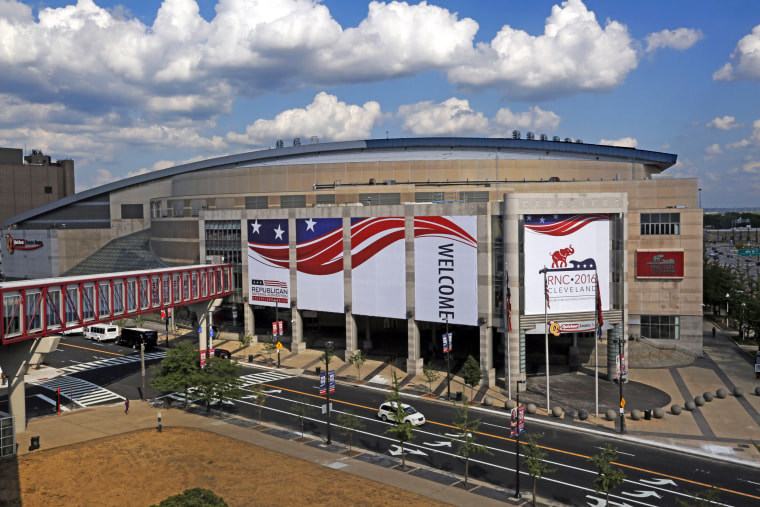CLEVELAND, Ohio — Donald Trump’s team will be on high alert Thursday at the wonky Republican Convention Rules Committee meeting as opponents push for changes to make it more difficult for him to win the necessary majority of delegates to claim the nomination.
Here are five things to watch coming out of the usually ignored meeting of 112 delegates.
The ‘Conscience’ Clause
The highest-profile change expected to come up is one being pushed by Colorado Delegate Kendal Unruh that would allow delegates to vote their “conscience,” rather than for the candidate to whom they’re bound.
Anti-Trump delegates know they can’t get a majority of the committee to back the conscience clause — so instead they’re trying for just 28. That would allow them to submit a “minority report” to a vote of the full convention, where it would need to draw majority support, and they say they’ve identified around 1,400 delegates that oppose Trump. Last weekend, Unruh insisted she already had 28 votes lined up for a minority report, but an NBC News whip count only found around 16 the group could likely count on. Still, the count found that another 28 could be up for grabs, so there’s room for growth — and they could get a boost if Utah Sen. Mike Lee and his wife come on-board, as operatives working on both sides of the debate expect.
Watch Team Trump’s Rules Committee study group — Vincent DeVito, Demetra Demonte, Alex Willette and Bill Palatucci — to get a sense of how confident the Trump campaign feels about the conscience clausedebate.
Bound vs. Unbound
Related to the “conscience” clause is the binding of delegates. A faction exists within the committee that argues Republican Party rules do not require delegates to be bound to the candidate based on results from the primary. This is important because if delegates are not bound to primary results, then delegates, many of them not enthusiastic about Trump, could easily vote against him and possibly deny him the support of a majority of delegates. Republican Party officials insist that the rules say delegates are bound.
This group is not new, but its plight has gained more exposure because of opposition to Trump, and a supporter of unbound is planning to offer a proposal that would tackle the issue once and for all.
Nominating Threshold
A handful of other avenues exist for the Rules Committee to affect the convention and potentially open it up to a Trump alternative. One option is to lower the delegates threshold required to put a candidate’s name into the process, which currently requires that candidates win a majority of delegates in eight states to have their name put up for nomination.
Ken Cuccinelli, who ran Sen. Ted Cruz's delegate operation during the primary, is leading a coalition of conservatives looking at a wide array of changes, including one to lower that threshold to a “majority of three states or a plurality of five states.” Cuccinelli is looking to make a change during the next election cycle, not the current convention, but anything proposed by one of his allies could be a jumping-off point for a broader debate over next week's event.
Some have also suggested lowering the magic 1,237 number a candidate needs to get the nomination, which could easily open up the convention on the first ballot.
Carve-out States
Iowa, New Hampshire, South Carolina and Nevada are the four states given preference in the presidential nominating process. A proposal to take away these four states’ special status is expected to be debated. The other 46 states don’t like that those four have preference, but Nevada is the one that might be most in jeopardy.
Delegates are also considering requiring all states to hold closed primaries, after a cycle in which Trump benefitted from the infusion of independent and Democratic voters into open primaries nationwide.
The RNC vs The Grassroots
Cuccinelli is also planning to propose a number of changes that would transfer power from the RNC chairman to the RNC members, most notably the power to appoint the heads of the RNC’s subcommittees (rules, budget, resolutions, and the rest). It’s a proposal that’s likely to meet stiff resistance in the committee, but it could be up for debate if the Trump campaign sees a need to make deals on some conservative priorities to avoid the passage of any changes that could hurt their candidate — something a top aide said was on the table going into the committee.

